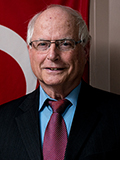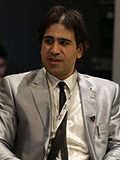| If you can't view the email, please click here. |
|
|
|
From the Desk of the Editor
Süreya Martha Köprülü
In this issue of Turkish Policy Quarterly (TPQ), our authors carefully consider the vortex of catalysts that have inflamed the Kurdish issue – the Syrian quagmire, ISIL terrorism, political polarization in Turkey – and their wider implications for both regional stability and the trajectory of the current conflict in Syria. Our authors underscore the need to revive the Turkey-PKK peace process, which will prevent further setbacks to a coordinated fight against ISIL, as well as initiate a broader effort to bridge Turkish and Kurdish concerns.
In Turkey's climate of increasing self-censorship and political polarization, and despite our resolute efforts to represent their views, in this issue we are missing key perspectives, from the incumbent Justice and Development Party (AKP) and two of the opposition parties, the Nationalist Movement Party (MHP) and the Peoples' Democratic Party (HDP). The dwindling scope of debate and their collective silence on an issue with serious ramifications for Turkey's long-term stability do not augur well for the success of an inclusive politician-led process to resolve the Kurdish question, or for the democratic trajectory of the country.
|
|
Inclusive Ways to Peace and Democracy in Turkey
Gülseren Onanç 
"Although there are four political parties in Parliament, President Recep Tayyip Erdoğan and his ruling AKP determine almost every issue without the participation of other political parties or civil society. The President's aim is to fundamentally rewrite the Turkish constitution to establish a powerful presidency that would replace the current parliamentary system."
"The CHP shall play a critical role in facilitating bridges between the east and the west of Turkey. CHP representatives from all over Turkey have visited the region and have shown solidarity with the Kurdish victims of human rights violations. However, we do not see collective minds developing between political parties."
"The EU used to be an anchor for the democratization process in Turkey and a major referee, but not anymore. The European Union bows to Erdoğan in hopes that he will relieve the refugee crisis. Even though Turkey has moved significantly away from the Copenhagen Criteria, the EU does not properly criticize the AKP and Erdoğan."
|
|
|
Syria's Dark Shadow over US-Turkey Relations
Henri J. Barkey

"In the run up to the first of the 2015 parliamentary elections in June 2015, Erdoğan's anti-Democratic Union Party (PYD) and anti-Kobani stand backfired: arguably it was an important if not critical factor in the defection of Kurds from the AKP."
"For two reasons the Syrian crisis has in effect become a domestic political question for Turkey. First, it has had ripple effects through Kurdish politics. Kobani and the PYD's battleground successes galvanized the Kurds throughout the region and provided a shot in the arm and a source of great pride for the Kurds. Second is the emergence in Turkey proper of an infrastructure supportive of the likes of both Al-Nusra and ISIL, which gave government policy a sectarian bent…"
"Erdoğan's strident rhetoric against Washington – challenging the Obama administration to choose between Turkey and the PYD – risks damaging relations further especially because the US heeded Turkey's call to prevent the PYD from being invited to the Geneva talks. In a similar vein, Turkish authorities were quick to blame the PYD for a 17 February 2016 bomb attack in the heart of Ankara; it soon became apparent that the act had been perpetrated by a renegade PKK outfit, TAK."
|
|
|
Decentralization for Peace in Turkey, Iraq & Syria
Aydın Selcen

"The [Turkish] republic presently faces existential challenges presented not only from the implosion of Iraq and Syria and the subsequent emergence of the Islamic State of Iraq and the Levant (ISIL), but also from the breakdown in the 'peace process' between the state apparatus and the PKK. This should instill in all a sense of urgency when it comes to reinvigorating the discussion of decentralization which has essentially been shelved."
"There is a structural contradiction in Ankara's policies as the Turkish government seems to be encouraging further autonomy of the federal Kurdistan Region of Iraq (KRI) while fiercely resisting it in Turkey and Syria."
"For Turkey to find a healthy outcome to its present regional challenges and its own Kurdish issue, level-headed statesmanship is essential. It is the nature of peace talks with armed organizations like the PKK to remain secret. Yet, fundamental rights like education in Kurdish are part of legislation, not secret negotiations."
|
|
|
Ankara vs. the PKK: Old War, New Strategies
Metin Gürcan

"Several factors distinguish the current round of Ankara-PKK clashes from the violence of the 1990s: shifting the fight to urban centers, the involvement of PKK youth militias, activist violence, the entry of proxies, and the increased importance of regional dynamics."
"The PKK thinks that it can further its aim of 'democratic autonomy' with a new strategy by setting thresholds it thinks the state cannot exceed. In this sense, the PKK seems to be using new tactics of violence, which are not as extreme as those of the guerrilla war, but whose symbolic effect is strong enough to achieve its political objectives."
"Ankara's current and obvious ambivalence between an enemy-centric approach to influence the majority at the national level and a population-centric approach to gain hearts and minds of those at the local level, is the very first reason why the current conflict is in a limbo zone between the counterterror paradigm and the counter insurgency/COIN paradigm."
|
|
|
New Turkey-PKK Talks: An Inevitability Postponed
Nigar Göksel & Berkay Mandıracı

"The tragic paradox is that the previous peace efforts were born of a realization by the leaderships of both sides that there can be no winner from military confrontation. Turkey and the PKK should urgently build their way back to peace talks."
"The peace process should have two tracks. On one hand, talks with the PKK should resume with the goal of obtaining the withdrawal of its fighters from Turkey and agreement on mechanisms for amnesty and reintegration in Turkey of those who are ready to disarm. On a separate track, the government and all legal parties in Ankara should gather together, preferably involving Parliament, to address longstanding demands of Turkey's Kurdish-speaking communities (…) Such an effort would need to include mother-tongue education rights, decentralization for the whole of Turkey, a new constitution that removes even the appearance of discrimination, fairer anti-terrorism laws, and the lowering of the 10 percent national vote threshold for a party to enter Parliament."
|
|
|
US-Turkey Relations at a Breaking Point over the Kurds
Tolga Tanış

"The breaking point in US-Turkish relations occurred when the US military initiated airdrops on 19 October 2014, in the vicinity of Kobani, Syria, resupplying People's Protection Units (YPG) forces on the ground to defend the city against ISIL. For the first time since Obama took office in 2009, it became evident that the US government did not care what the Turks thought about an issue that Ankara considered a national security matter."
"What will push Turkey to a rational stance on regional issues will not be its commitment to do more in the fight against ISIL. What will also soothe relations with Washington after the breaking point crossed in Kobani will be the renewal of the peace process at home, which is the only way President Erdoğan can realize his goals in domestic politics."
|
|
|
The Kurdish Issue in Turkey: Back to Square One?
Michael Gunter

"Compared to the days when the very word 'Kurd' constituted a four-letter word in the Kemalist lexicon and denial of a Kurdish ethnic problem prevailed, the Kurdish issue now has been institutionalized within Turkish domestic politics and furthermore regionalized, indeed internationalized."
"The breakdown of the process in July 2015 is probably just one more tortured step toward an eventual solution of the Kurdish problem rather than a return to square one. Even as they now fight and blame each other for the situation, the two sides are maneuvering toward new positions within a continuing process."
|
|
|
How ISIL Advanced Kurdish Nationalism
Namo Abdulla

"Syrian Kurds do not share the same degree of aspirations for independence as their brethren in Iraq. The reasons are multiple. Firstly, Syrian Kurds espouse the more Marxist and anti-state ideology propounded by Abdullah Öcalan, the imprisoned leader of the PKK. What they offer instead is something they have begun to implement in northern Syria, namely autonomous cantons for every city and town with their own ministers and governors, and full control over their internal affairs."
"Even if the rise of ISIL has advanced Kurdish nationalism in Iraq, it has not helped the process of democratization. Since the beginning of ISIL aggression, Iraqi Kurdistan has not held elections. The last term of its president, Masoud Barzani, came to an end in August 2015, yet he continues to serve as president in spite of objections from many people, including the major opposition parties."
|
|
|
The Tyranny of the Nation-State
Süha Atatüre

"While the nation-state homogenizes society, the democratic state tolerates heterogeneity. While the nation-state practices oppression and violence against society, the democratic state emphasizes the norms of law and the notion of rights that enable society to coexist. While the basic driving force of the nation-state is ideology, the democratic state is based on contemporary theoretical realities."
"(…) During the lifetime of a state, the unsolved problems leftover from a previous period's ideologies and principal theories cannot be solved by relying again on the same theoretical consciousness. Political will can change the political discourse and action according to contemporary theoretical knowledge by constantly improving, transforming, and by internalizing the theories that produce actionable knowledge, enabling it to resolve its issues from the past."
|
|
|
Odd Bedfellows: Turkey and Iran
Majid Rafizadeh

"The common and shared strategic and geopolitical goals between Iran and Syria have driven Turkey and Iran further away from each other in the last few years. Iran continues to view Assad's government as a crucial platform geopolitically, strategically, and geographically to both create and support other Shiite proxies in the Middle East, such as Hezbollah. Iran also continues to utilize Syria as a conduit to deliver weapons and train its proxies."
"The deep-rooted suspicion and competition between Turkey and Iran has grown in recent years. Several factors have played a crucial role in intensifying this rivalry, which are linked to the geopolitical strategies of these two countries. Nevertheless, the economic convergence of interests as well as the lifting of sanctions on Iran appears to have ushered in a new era of cooperation between Ankara and Tehran."
|
|
|
Turkish Business in the Kurdistan Region of Iraq
Christina Bache Fidan

"The creation of a liberal business and investment climate aimed at the international private sector, coupled with the entrepreneurial spirit of the Turkish private sector and the normalization of relations between Ankara and Erbil, resulted in significant economic cooperation, unthinkable a decade ago."
"It is essential the KRG not only immediately receive its obligatory portion of the Iraqi federal budget, but it should also receive an expanded amount to reflect the costs of hosting the additional two million Iraqis and Syrians that are currently living in the KRI. It is imperative Baghdad and Erbil resolve their political dispute over hydrocarbon policy and jointly address human security needs, in order to preempt subsequent violent struggles over political power and resource allocation in the future."
|
|
|
Turkey Caught in the Maelstrom of Syria
Pantelis Touloumakos

"The Turkish government decided to shoot down the Russian jet in order to enhance its arguments about the necessity of imposing a no-fly zone in Syria. In other words, Turkey tried to convey the message that it is no longer willing to tolerate the slightest violation of its airspace. Furthermore, given ongoing aerial warfare on the Turkish-Syrian border, a new violation of Turkish airspace seems very likely."
"The existence of two autonomous Kurdish states could prompt further resistance from Turkey's Kurdish-speaking people. The current level of cooperation and support from Turkish and Iraqi Kurds to Syrian Kurds is a clear indication of what Turkey might experience in the future. Furthermore, today's Iraq as well as a post-civil war Syria are going to be very fragile states, sensitive to a potential destabilization."
|
|
|
Have a counter-argument to one of the authors’ views?
Share it on TPQ’s Debates section. For guidelines click here. |
|
|
The Premium Corporate Sponsor of this Issue
 |
|
|
Thanks to our partners |
 |
 |
|
|
 |
Address: Kadir Has Üniversitesi Cibali Kampüsü Sosyal Sorumluluk Binası ( Beyaz Ev )
Küçük Mustafa Paşa Mah. Seferikoz Sok. No:14 Kat.1 Fatih- İstanbul
Phone: +90 212 621 4442 - +90 212 621 9258 Fax: +90 212 531 8718 info@turkishpolicy.com
Click to unsubscribe |
|
|
